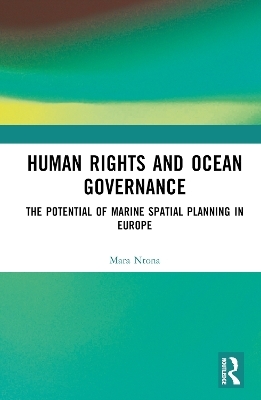
Human Rights and Ocean Governance
Routledge (Verlag)
978-1-032-51959-3 (ISBN)
Maritime spatial planning (MSP) has become the dominant marine management paradigm, with MSP frameworks already at various stages of elaboration and implementation in more than half of all coastal states. However, as experience with MSP accrues, a central systemic shortcoming has become apparent, insofar as the normative frameworks that underpin MSP tend to be grounded in a rationalistic and economistic worldview. The result is a post-political, neoliberal approach to the implementation of MSP, which favours technocratic ‘fixes’ to complex societal problems over efforts to address underlying issues of power and inequality. Building upon the new field of critical MSP studies, this book offers a much-neglected legal contribution. More specifically, it analyses the extent to which law, and particularly human rights law, can be utilised to meaningfully challenge the unjust patterns of human-ocean interaction that MSP preserves or creates, and so provide a vehicle for the formulation and realisation of transformative blue futures. The book looks to human rights as norms that are uniquely capable of bringing into relief the values, cause-and-effect relationships, and uncertainties that prevailing capitalist-industrial framings of the ocean tend to downplay or, worse, disregard. And so, from a more pragmatic viewpoint, the book argues that the policy and advocacy tools associated with human rights can be used within MSP processes to foster patterns of human-ocean interaction which are more conducive to social and environmental justice.
This book will be of interest to legal and planning scholars, geographers, and others concerned with ocean governance and the ‘blue turn’ in the social sciences and humanities more generally.
Mara Ntona is Lecturer in Human Rights and Environmental Law at the University of Strathclyde, Glasgow, UK.
Acknowledgments vii
1 Introduction 1
2 The Oceanic imaginary in Western culture, thought, and law: archetypes and alternatives 15
1. Introduction 15
2. The ghosts of oceanic imaginaries past 17
2.1. The oceanic sublime, fear, and the allure of the unknown 17
2.1. The advent of the geo-coded ocean and the birth of the modern law of the sea 19
2.2. Winds of ‘progress’, tide of resistance 22
3. Maritime territorialisation under the LOSC: old legacies, new institutions 27
3.1. An introduction to coastal state jurisdiction 29
3.2. The blind spots of maritime sovereignty 35
4. Maritime territorialisation under MSP: a missed opportunity for transformation? 39
4.1. The emergence and early evolution of MSP 41
4.2. The legal framework for MSP in the EU 43
4.3. The critical turn in MSP studies 47
5. The untapped potential of human rights 52
5.1. Horizons established 53
5.2. Horizons expanded 55
6. Conclusion 67
3 The ecosystem approach in marine planning and management: from ‘productively ambiguous’ to normatively productive 98
1. Introduction 98
2. Ecosystem-based marine planning and management under EU law 99
2.1. The ecosystem approach as an exercise in scientific and technological-managerial rationality 101
2.2. The ecosystem approach as a locus of scalar politics and struggles 114
2.2.1. Connecting the dots between ecological and geographic conceptions of scale 116
2.2.2. The legal scaling of ecosystem-based marine planning and management in the EU 125
3. Ecosystem-based marine planning and management under international biodiversity law 132
3.1. The ecosystem approach as a vehicle for communitybased management 134
3.2. The ecosystem approach as a vehicle for upholding and cultivating relational values 141
4. Conclusion 145
4 The maritime dimension of EU territorial action: towards just blue futures? 169
1. Introduction 169
2. The rise and maturation of EU territorial action 171
2.1. The birth of cohesion policy (1957–1989) 172
2.2. The emergence of European spatial planning (1989–1999) 175
2.3. Territorial cohesion (1999–present) 180
2.4. EU territorial action coming of age? The European Social Model and its spatial and ecological dimensions 184
3. European imaginaries of maritime territorial vulnerability, equity, and solidarity 189
3.1. Locating spatial justice 191
3.2. Territorial vulnerability as spatial peripherality and functional marginality 196
3.3. Territorial vulnerability as ecological and cultural sensitivity 200
3.4. Prospects for the ‘insurgent architects’ of Europe’s blue futures 207
4. Conclusion 214
5 Conclusion 238
Index 246
| Erscheinungsdatum | 14.12.2023 |
|---|---|
| Verlagsort | London |
| Sprache | englisch |
| Maße | 156 x 234 mm |
| Gewicht | 644 g |
| Themenwelt | Naturwissenschaften ► Geowissenschaften ► Hydrologie / Ozeanografie |
| Weitere Fachgebiete ► Land- / Forstwirtschaft / Fischerei | |
| ISBN-10 | 1-032-51959-2 / 1032519592 |
| ISBN-13 | 978-1-032-51959-3 / 9781032519593 |
| Zustand | Neuware |
| Informationen gemäß Produktsicherheitsverordnung (GPSR) | |
| Haben Sie eine Frage zum Produkt? |
aus dem Bereich


